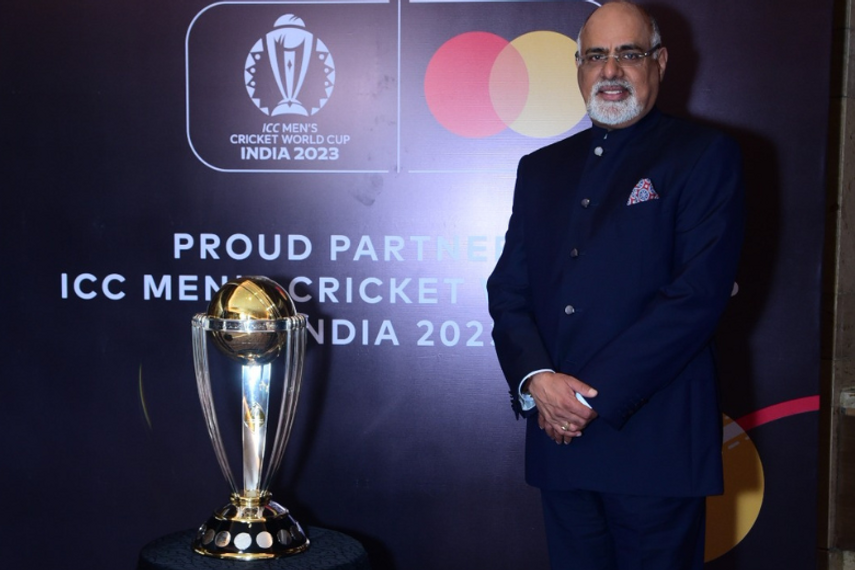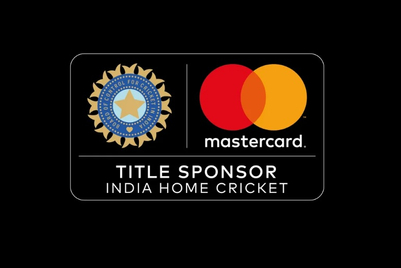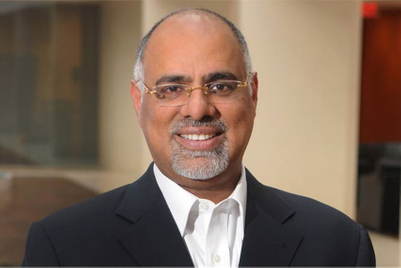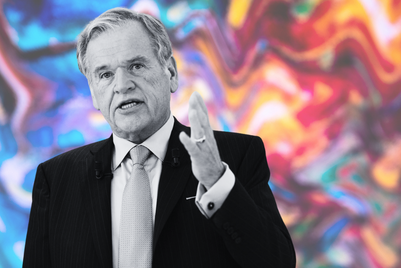
The International Cricket Council (ICC) has announced Mastercard as a global partner for the ICC Men’s Cricket World Cup 2023 to be held in India between 5 October and 19 November.
Aside from an exclusive 24-hour pre-sale window, Mastercard holders will have access to a variety of benefits. These perks include the possibility of meeting cricket legends, having a close encounter with the Men’s Cricket World Cup trophy, offers on official ICC merchandise, and enjoying unique access on match days. Children of cardholders aged between 12-18 years will also get a chance to participate in the flagbearer program.
Mastercard's sponsorship of the ICC property underscores the brand's commitment to the game and adds to the global tech company's repertoire of impressive international sports partnerships, which include associations with the likes of UEFA Champions League and the PGA Tour.
Campaign India caught up with Raja Rajamannar, chief marketing and communications officer, Mastercard on the sidelines of the event held in Mumbai on 23 August to announce the association. The marketer also discloses the reason the partnership with BCCI was not renewed, why he believes marketing is facing an existential threat today, and more.
Edited excerpts:
Mastercard is known to have long-term partnerships globally, stretching over 10-15 years when it enters into sponsorships. In this context, the association with the BCCI which was not renewed beyond six-odd months was pretty short-term. Why so?
It's not about BCCI, its about cricket. And in the world of cricket what we are trying to do is identify those opportunities where there’s a lot of scale, and then see if the economics are suitable because we are a global brand. I have spent over 15 years working for a bank and have gotten quite conditioned to being quantitative. We do our return on investments quite maniacally, and when you look at the ROI what are we measuring our return on? So we have 3 dimensions that we take on:
One, is it making a difference to our brand? Does the brand become more salient, more desirable? And we have got specific, quantitative metrics to measure it.
Secondly, does it help drive our business? Our business is a B2B business, so I have to convince an Axis Bank, an HDFC, an ICICI and so on. The banks are the ones who give us the platform, and they then issue cards on our network to the consumers. So are we winning business, are we winning preference in their minds- we measure it.
Does it give us any competitive advantage- including emotional advantages as well as tangible ones? That’s the third dimension. And from those what we have been extremely positive about is the metrics we have got from our last year’s sponsorship (with BCCI). So it's not that it didn’t work, it actually worked quite well.
We are one of the most prominent brands in the world. Interestingly our budgets don’t correspondingly measure to it. We do not operate with an infinite pool of money. We try to figure out we have got so much marketing investment to do, so where do we want to play now? Firstly, we look at the ‘passion’ category, then at who’s the partner in the category. And if it's working consistently we keep extending our association.
In the context of cricket, we don’t have so much money to invest in this and that also. So we have to make our tradeoffs. Thus we zoomed in on ICC for this year. We are not walking away from something, but walking towards something that we thought was an ideal opportunity that hopefully will also give us better mileage.
So would you be open to revisiting the BCCI partnership later, post this year?
We're not walking away or shutting doors behind us at all. This is an extraordinarily unique situation where we got this fantastic opportunity, wherein the cricket world cup is happening in India. That's a rare and big event. Therefore, when this opportunity came, we were thrilled. But we don't have unlimited funds to do everything that we want to do. So we will keep our options open for the future.
Our commitment is to bring priceless experiences to our consumers and customers in the ‘passionate’ category. Cricket is clearly in that category so we will continue to be very committed to that space. But how will we manifest it- whether it's a partnership with organisation A, B, or C, that's something we will have absolutely an open-door approach.
Any plans for an ICC Women's World Cup collaboration?
Gender balance is a big deal for us. And we have been doing it in sport after sport around the world and across sports, whether it is golf, baseball or tennis. Even last year, for instance, for BCCI we had got to the women’s side of the game as well, which worked quite well for us.So women's sports is always of interest.
Having said that, at the end of the day, it's all about contextually what opportunities we have at any given point in time, including in women’s sports, and then on what kinds of funds we have, what kind of priorities we have in the business for that year etc. Based on all of that we take the call.
Coming to your recently published book, ‘Quantum Marketing’, you have stated in the book that 'marketing is facing an existential threat'. Can you explain what you mean by that?
Firstly, when you look at surveys that are done amongst CEOs, more than 70% of them globally are saying that they don't have confidence that their CMOs and their marketing teams can drive profitable growth for their companies. That's a dangerous frame of mind for the CEOs. Secondly, many companies are eliminating the roles of CMOs and this includes the likes of Johnson & Johnson. These are not like obscure industrial companies, which never had marketing departments to start with, but are blue chip marketing companies, which had marketing departments that were directly reporting to the CEO.
That brings us to another point, which is marketing instead of reporting directly to the CEO is getting pushed down to report to roles like chief growth officer, chief revenue officer, chief customer officer, which are coming up. Now if you take away revenues, customers and growth, what is left in marketing? Fluff. So that's why I say there's a crisis in the existing marketing scenario.
In the old days, marketing used to be purely around emotions, psychology, sociology, anthropology, design, and brand. These are very critical even today, but this is what it used to be all in all, very little of technology, data, finance was there.
With the advent of the internet and data analytics into marketing, suddenly the capability to do more refined technical marketing came about. Performance marketing, targeting precisely, measuring return on investment, and so on that traditional marketing folks struggled to get their heads around because they could not do the transition. Programmatic has been around for 20 years, but if you ask many marketers how exactly programmatic works, they don't understand, unfortunately.
Today, marketing is becoming more and more technology-driven, with newer ideas of augmented reality, virtual reality, and artificial intelligence. These are all quantitative, it's easy to get carried away by the buzz, but unless you get to the substance you will not be able to leverage it for your organisation. That’s where the problem lies, and all this is leading to the decline. The reality is most of the CMOs in many of the organisations do not measure their ROI very methodically and because of this, they are not able to prove what they are contributing to the business or the return on investment that they are making. So marketers have to educate themselves. They have to learn, they have to invest in training, resources and efforts for their own team members. It's extremely critical.
Now, when the playing field gets level - as technology is a great leveler- be it a big company or small as everyone has access to data, tools, and technologies. The differentiation is going to happen through creativity, through innovation.
Also, marketers have to realise there’s an opportunity and threat simultaneously. We're in an existential crisis, but it's also a golden period. And if one knows how to go about it, one has to consciously be an evangelist for marketing in your own organisation, be it with the CEO or with the other C-suite executives.
You spoke about the importance of communicating the right brief and brand objective to agencies for a campaign. What's the objective brief behind the soon-to-be-launched ICC campaign?
The objective was very simple. It has to help us at three levels - the brand, the business, and on the competitive advantage. On the brand, we know exactly what impression we want to create in people's minds, so we articulated that. On the business, we know what objectives we have, which means who are we partnering with, who is this campaign going to be run with, and what promotions are we going to run with. Thirdly, from a competitive advantage, we're not talking about something that is very transactional, but about MasterCard as a platform for priceless experiences. So accordingly the local team, which briefs the local agency folks, brought these three pointers to life in the brief.


.jpg&h=334&w=500&q=100&v=20250320&c=1)
.jpg&h=334&w=500&q=100&v=20250320&c=1)


.jpg&h=334&w=500&q=100&v=20250320&c=1)


.jpg&h=334&w=500&q=100&v=20250320&c=1)
.jpg&h=334&w=500&q=100&v=20250320&c=1)





.jpg&h=268&w=401&q=100&v=20250320&c=1)
.jpg&h=268&w=401&q=100&v=20250320&c=1)


